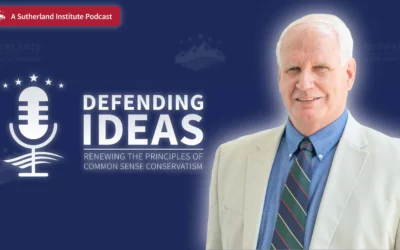
Written by Christine Cooke Fairbanks
February 7, 2024
Originally published in Utah Policy.
Utah Gov. Spencer Cox boasted that Utah is “weird” (in good ways) during his 2024 State of the State address because we lead the nation in rejecting zero-sum thinking. It’s true: Utah has an impressive record of finding consensus policy solutions on politically thorny issues – from the Utah Compact to the Utah Compromise.
Utah should continue its “weird” approach by creating curriculum transparency reform that empowers parents, supports teachers, and strengthens the parent-teacher partnership.
The current culture war in education often pits parents against teachers in broad and unflattering terms. Where one advances, the other loses. This has manifested in curriculum transparency debates.
That narrative says educators are teaching ideology to students while parents disrupt education by undermining the expertise of educators.
Certainly, there have been some reports of educators teaching flagrantly political ideas in classrooms. And it is impossible to appease every parent, many of whom have an impassioned perspective on how to best educate their child.
But the majority of people do not fit into extreme categories. That opens the door for a consensus solution on curriculum transparency.
Proponents of curriculum transparency talk about it as a way for parents to exercise their right to understand and direct their child’s education. Opponents of curriculum transparency talk about the burden it creates on teachers.
Utah can rise above this polarizing divide and find a consensus solution where curriculum transparency strengthens the parent-teacher partnership around student learning. Such a solution will: (1) build trust between parents, teachers and public schools, (2) make parents and educators sharers of information about what a student will learn, and (3) make it attractive for teachers to do the work of being transparent.
Acknowledging teacher workload in realistic terms is key to getting the policy right. Creativity in policy discussions can help us avoid simply mandating transparency and punishing teachers who dissent. A consensus transparency policy could offer paid professional development days before the school year to teachers willing to put classroom materials online, like a class syllabus (updated annually) for anyone to access.
Posting classroom curriculum online can have other benefits: helping teachers map out instruction in advance, giving parents (and students) opportunities to look ahead, and offering instructional ideas to other educators teaching the same subject, especially in under-resourced subjects that both parents and teachers think are essential, such as civics and history.
Teachers who do the work of being transparent and who keep their instruction within the bounds of state standards could also receive additional work protections around their instruction. So rather than leaving a teacher to fear that transparency may end their career, a consensus transparency policy would offer them increased security around instruction about tricky, state-mandated subjects.
Last year, Utah lawmakers enacted a consensus policy that established a new education choice program while increasing public school teacher salaries. Policymakers in the current legislative session are trying to address many issues faced by teachers, like how the state can support them in student discipline, offer fair performance evaluations, and allow for higher teacher salaries. A consensus curriculum transparency policy will bolster these efforts.
Curriculum transparency should obviously also help parents. When policies or efforts give only a bare minimum of information or place barriers in the way of transparency, it stokes distrust among parents. As parents feel that teachers are trying to communicate with them in good faith, trust can be renewed. Where there is trust, parents and teachers can work better together toward the outcome they both desire most: student learning.
Seeking a consensus curriculum transparency policy is a natural next step for Utah to keep being “weird” and reject zero-sum thinking. Policymakers should embrace the opportunity to renew trust in public schools while also strengthening the partnership between parents and teachers.
More Insights
Read More
Do we need to care about the Utah State Board of Education?
For any Utah voters who also feel like K-12 public education is headed in the wrong direction, learning about the candidates running for a seat on the Utah State Board of Education (USBE) is a wise choice this election season.
Defending education choice the right way
Education choice has exploded in popularity across the nation in recent years. So why does it remain a contentious point of debate in some parts of the country?
Looking at Supreme Court and religious freedom through the lens of the presidential campaign
Two constitutional issues highlight similarities and differences between the Biden and Trump administrations.


